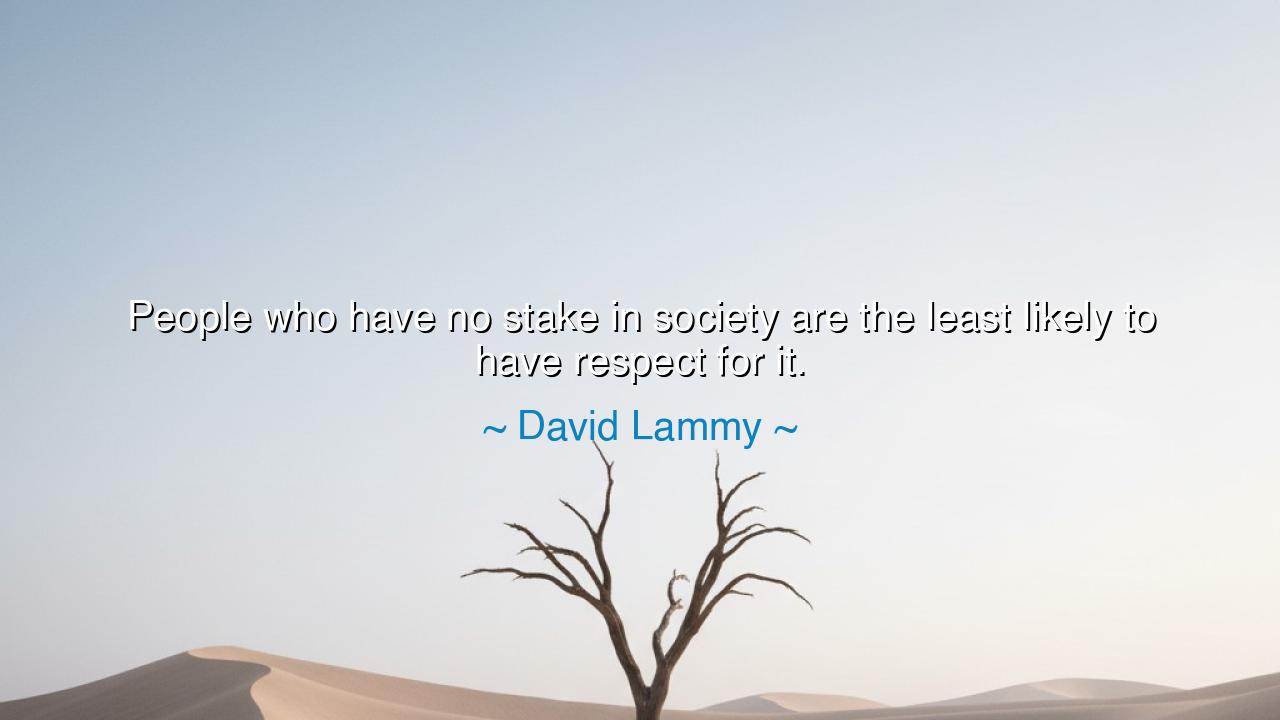
People who have no stake in society are the least likely to have






Hear the solemn truth in the words of David Lammy: “People who have no stake in society are the least likely to have respect for it.” In this brief utterance lies a lesson that resounds through the ages: that a people denied belonging, denied opportunity, denied a place in the house of their nation, will find little reason to honor its walls. For how can one cherish what has cast them aside? How can one defend a structure that offers them neither roof nor bread? The foundation of any society rests not upon its laws alone, but upon the sense that all who dwell within it are bound to its destiny.
The meaning is clear: when men and women are stripped of stake, when they own nothing of the common future, they drift like exiles in their own land. They walk its streets, yet feel they are not of it. They live under its laws, yet feel those laws were written for others. Thus, the respect that gives rise to peace and order withers away, and in its place grows resentment, mistrust, and rebellion. A society that forgets this truth courts its own undoing.
Behold the history of Rome, once the glory of the world. In its early days, citizens shared land, spoils, and the pride of belonging to the Republic. But in later times, vast estates fell into the hands of the few, while the many became landless, homeless, and voiceless. The mighty city, though crowned with marble, was hollowed within. Bread and games could not disguise the fact that a multitude had no stake in the empire they defended. And when respect died in the hearts of the masses, Rome itself faltered, its strength eroded not by foreign armies alone, but by the despair of its own people.
Consider, too, the story of the French Revolution. For centuries, the peasants bore the weight of labor while nobles feasted on privilege. The poor had no share in the fruits of their toil, no voice in the councils of power. They tilled fields they did not own, lived under laws they did not write, and paid taxes from which they saw no relief. When hunger grew sharp and injustice unbearable, the respect for king and crown dissolved. The oppressed rose in fury, toppling thrones and sweeping aside the old order. Their wrath was the cry of a people without stake, demanding at last to be seen.
From these examples, let the lesson be carved upon your heart: a society that excludes its children from its blessings sows the seeds of its own destruction. Respect flows from belonging. Loyalty grows where there is investment. Love of country arises when the country first shows love to its people. The wisdom of Lammy’s words is both warning and guide: no ruler, no lawmaker, no leader can expect obedience where they have not granted dignity.
Therefore, child of tomorrow, walk with this knowledge: to build a strong society, you must give others a place within it. Offer opportunity where there is poverty, lend a voice where there is silence, open doors where there are only walls. Seek not only your own stake, but strive that all may have one. For when your neighbor prospers, your city prospers. When your brother or sister is honored, the whole community stands taller.
To live by this teaching, act with justice in your dealings. If you are an employer, pay fairly. If you are a leader, listen humbly. If you are a neighbor, include warmly. Even the smallest deed of inclusion gives someone a stake. And when you stand before the powers of your age, remind them that the greatness of a nation lies not in its monuments but in the extent to which each soul feels it belongs.
Thus, in the echo of David Lammy’s wisdom, may you understand: to give people a stake is to give them a reason to respect, protect, and uplift the society they share. Let no one be a stranger in their own home, and your community shall endure, united, strong, and unshaken by the storms of time.






AAdministratorAdministrator
Welcome, honored guests. Please leave a comment, we will respond soon